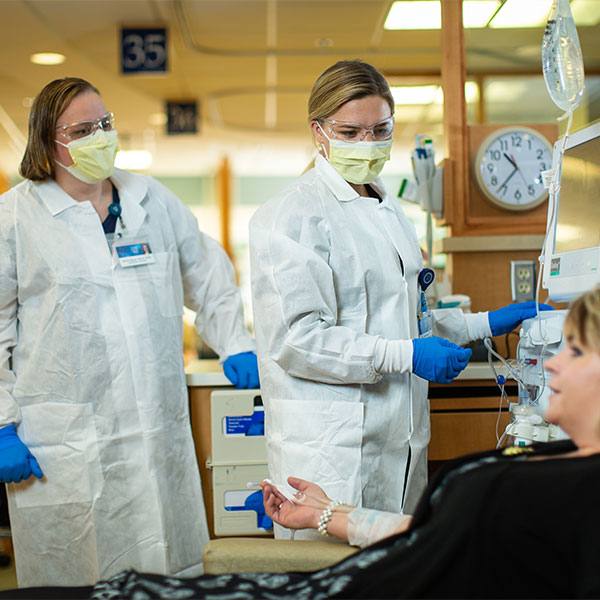-
Biotherapeutics
Advancing regenerative medicine through education
Education is a cornerstone of Mayo Clinic's strategy to bring regenerative medicine to more patients. A workforce trained in the emerging field of regenerative sciences is integral to advancing this new era of health care into daily clinical practice.
Mayo Clinic's Center for Regenerative Medicine has invested years developing, refining, and disseminating the "Regenerative Medicine and Surgery" course that prepares future physicians, scientists and general health care providers. This year, the initial week focuses on fundamentals of regenerative sciences, providing students with foundational scientific elements of regenerative medicine and a perspective into how clinical innovations in the field are affecting patients.
The "Fundamentals of Regenerative Sciences" virtual course for 2021 enrolled over 100 learners from around the globe, the largest class ever to attend a Mayo Clinic regenerative medicine structured course.
"The growing interest among trainees is another example of how the scholarly identity of regenerative medicine is increasingly recognized," says Saranya Wyles, M.D., Ph.D., course director. "Mayo Clinic developed the first patient-centric curricula in this evolving field, and the body of knowledge is growing. This year, we offer our course in two parts. The first part focuses on the basics of regenerative sciences, and the second part goes more in depth on the clinical applications of regenerative medicine and surgery. We are excited by how this provides the foundation for a strong regenerative science- specialized workforce, ready to address patient needs."
Mayo Clinic is also among the first to offer patient-centered medical school and residency electives in regenerative medicine. Diverse topics are covered, including stem cell biology, tissue engineering, cell-free therapies, nanomedicine, biomanufacturing, regulatory affairs, commercialization of new biotherapies and bioethics in the context of a holistic approach to regeneration.
No longer science fiction
Regenerative medicine is like a window into what's next in health care. It seeks to shift the focus from treating disease to restoring health.
Ewoma Ogbaudu has long been intrigued with what's next in medicine. He's a big fan of science fiction, penning sci-fi comic books in his spare time. His fascination with futuristic therapies, and interest in orthopedics and osteoarthritis research, made the "Fundamentals of Regenerative Sciences" course a good choice for his educational program. The first-year student at Mayo Clinic Alix School of Medicine ― Arizona Campus quickly learned that regenerative medicine has moved beyond the lore of science fiction to clinical applications with global importance.
"I'm incredibly excited for the future of regenerative medicine, and I'm looking forward to helping conduct research in this field related to orthopedic surgery. More importantly, I hope to continue advancing conversations on health equity in regenerative science. As we endeavor to make strides in this emerging field, it's crucial that we include diverse physicians, researchers and patients when designing studies to ensure that regenerative treatments are not only effective for all, but also accessible for all," says Ogbaudu.
Ogbaudu, who emigrated from Nigeria when he was 3, wants to split his practice between the U.S. and his homeland in West Africa. He hopes to apply regenerative procedures such as platelet-rich plasma — platelets spun from a person's own blood to foster healing — to a subspecialty in hand surgery.
From first surgery to course participant
Shannon Strader, D.O., had an experience with Mayo Clinic that included a personal journey to health restoration well before she enrolled in the weeklong regenerative sciences course. Nearly 10 years ago, she was the first Mayo Clinic patient to have left renal vein transposition vascular surgery. That pioneering surgery was performed to correct a rare condition known as posterior nutcracker syndrome in which the left vein to the kidney passes behind the abdominal aorta, pressing against the spinal column and restricting drainage of the left kidney.
"Mayo Clinic gave me hope in what appeared to be a hopeless situation," says Dr. Strader.
Since her surgery, she has studied stem cell biology in college and graduated from medical school. Now a resident in Physical Medicine and Rehabilitation at the University of Louisville, Dr. Strader seized the opportunity to participate in the "Fundamentals of Regenerative Sciences"course.
She was invited as an AR3T National Institutes of Health-funded participant. AR3T is a resource center that builds research collaborations, provides educational opportunities and funds technology projects. She says that she is impressed with how the field of regenerative medicine is progressing and aspires to integrate it into her future pediatric physical rehabilitation practice.
"I hope to continue to research the potential for muscle regeneration in individuals with cerebral palsy and developmental disabilities. My goal is to further outcomes and optimize the quality of life for those with intellectual and developmental disabilities. I envision working as a clinician in a pediatric and transition clinic while pursuing translational research," says Dr. Strader.
The future of medicine
David Soriano, a first-year medical student in Mayo Clinic Alix School of Medicine is interested in a career the combines research and clinical applications. While he is still exploring the wide array of options in the medical field, he is drawn to orthopedic surgery. The regenerative sciences course was a natural fit for him, given regenerative medicine applications in the orthopedic practice.
"I believe regenerative medicine is the future of health care. The concept of regeneration has always captured the attention of visionary minds. Early pioneers in the field set lofty goals. After participating in this course and hearing the latest work from cutting-edge researchers, I can say that we have made some fantastic leaps toward realizing the pioneering visions that began the field," he says.
The "Fundamentals of Regenerative Sciences" course attracted students from Mayo Clinic, the University of Minnesota, the University of Louisville, Creighton University, Sheikh Shakhbout Medical City in Abu Dhabi and Kyoto University in Japan.
The Center for Regenerative Medicine will hold a second weeklong course that builds on these fundamental principles. The "Mayo Clinic Regenerative Medicine and Surgery" course will be offered in June.
###











